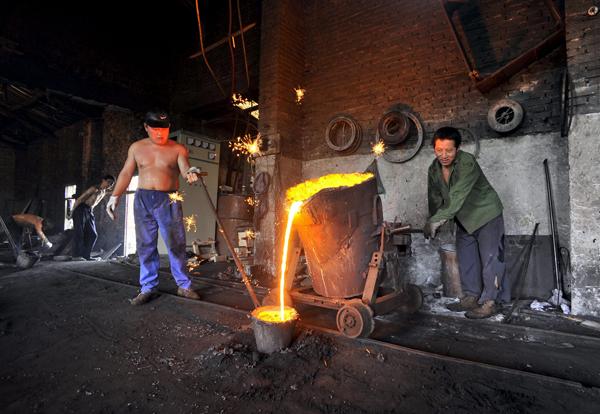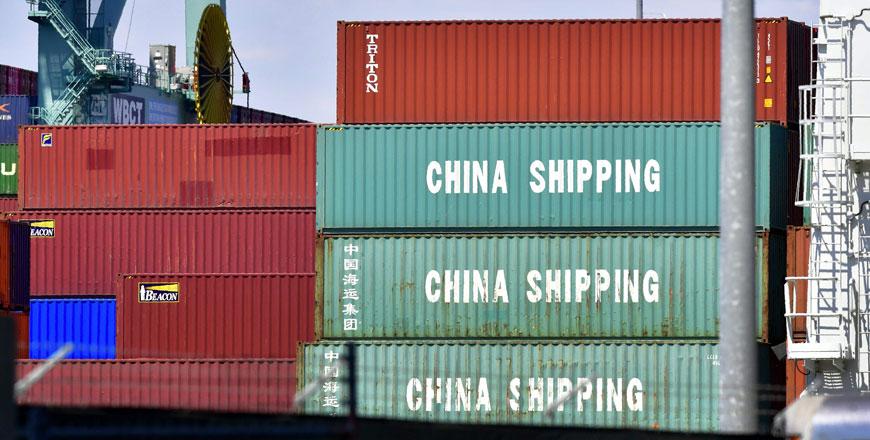You are here
Foreign direct investment in China rebounds 5.3%
By AFP - Jan 16,2014 - Last updated at Jan 16,2014

BEIJING — Overseas investment into China rebounded last year after declining in 2012, official data showed Thursday, as confidence in the country’s growth potential picks up.
Investment by China also rose and officials said it could overtake the incoming total this year — although Chinese businesses shied away from the European Union (EU) and Japan as market and political tensions become strained.
Foreign direct investment (FDI) into China, which excludes financial sectors, totalled $117.59 billion last year, the commerce ministry pointed out, adding it had “steadily rebounded”.
The figure is up 5.3 per cent from the $111.72 billion posted in 2012, when it skidded 3.7 per cent for the first time in three years in the face of economic weakness in developed markets and a growth slowdown at home.
Louis Kuijs, Hong Kong-based economist with Royal Bank of Scotland, said some strength in the economy, “especially in the second half of 2013”, and Beijing’s plan to transform its growth model helped investor confidence.
“The intentions of the government to change China’s pattern of growth to increase the role of domestic demand perhaps stimulated foreign companies to invest more,” he told AFP.
Chinese overseas investment rose 16.8 per cent to $90.17 billion last year, the ministry indicated, as mainland firms continue to buy foreign assets, particularly energy and resources, to power the world’s number two economy.
“China’s overseas investment will probably exceed FDI next year or in 2016, if not this year,” ministry spokesman Shen Danyang said.
Though destinations such as Russia and the United States saw sharp increases, investment in the EU and Japan fell.
Investment in the EU fell 13.6 per cent at a time when the two sides are embroiled in trade disputes including on Chinese solar panels and European wine.
There was also a 23.5 per cent slump in investment in Japan, as Asia’s two top economies remain engaged in a territorial row that has led to frostier relations.
The ministry did not provide total amounts to those destinations.
FDI from the EU into China jumped 18.1 per cent to $7.2 billion. Investment from Japan to China slipped 4.3 per cent to $7.1 billion.
Jeroen Dijsselbloem, Netherlands finance minister and president of the Eurogroup of eurozone finance chiefs, said Chinese officials did not bring up any concerns about investing in Europe during talks in Beijing.
“At least, we certainly made clear from our side that Chinese investment is very welcome in Europe,” he told reporters before the data release.
Markus Ederer, outgoing EU ambassador to China, said Chinese companies have far more access to Europe than vice versa.
“Would the Chinese ever allow a European company to lease a major port for 30 years?” he asked, referring to Chinese state-owned global shipping giant Cosco’s concession deal at the Greek port of Piraeus. “No.”
“Would the Chinese ever allow a European company to take over a Chinese car company?” he asked, referring to Geely’s acquisition of Sweden’s Volvo. “No.”
Kuijs said beyond political reasons, rising wage and transport costs in China, along with environmental regulations, have prompted European and Japanese firms to move output to cheaper regions or closer to home.
“China is kind of moving up the value chain,” he said. “But on the other hand, China is losing parts of the production chain that are now being done in cheaper countries.”
Among China’s outbound destinations, Russia soared 518.2 per cent to $4.08 billion last year with a raft of projects under way, including in the energy sector.
Investment in the United States also surged, 125 per cent to $4.23 billion. In September, shareholders of US pork giant Smithfield Foods agreed a takeover by China’s Shuanghui International, the biggest ever Chinese acquisition of a US company. FDI from the US rose 7.1 per cent to $3.35 billion.
By far, the most investment into China comes from a group of 10 Asian countries and regions including Hong Kong, Taiwan, Japan, Thailand and Singapore, and FDI from those economies rose 7.1 per cent to $102.52 billion.
According to the ministry, FDI in the services sector made up more than half the annual total for the first time, accounting for 52.3 per cent.
For December alone FDI increased 3.3 per cent year on year to $12.08 billion.
Related Articles
BEIJING — China's overcapacity in heavy industries is wreaking "far-reaching" damage on the global economy, with steel production "completel
BEIJING/WASHINGTON — China accused the United States of bullying and warned it would hit back after the Trump administration raised the stak
Nissan said Monday its nine-month net profit jumped 18.4 per cent, capping a buoyant earnings season for Japan’s top three automakers thanks to a cheap yen and rising sales in North America and China.















